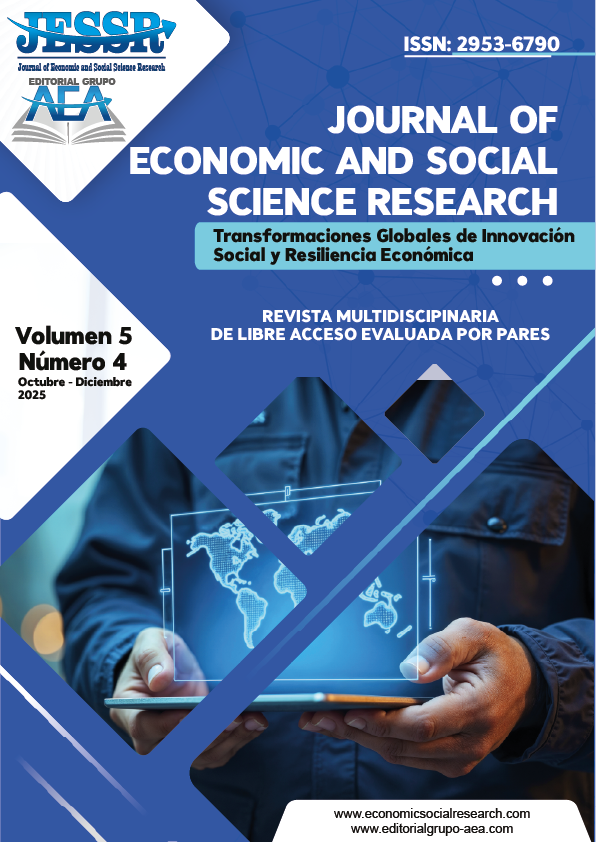Virtual learning environments as a pedagogical strategy for accessibility and inclusion of students with physical disabilities
Main Article Content
Abstract
Higher education currently faces the challenge of ensuring that virtual learning environments effectively address the needs of students with physical disabilities, fostering both accessibility and inclusion. Within this framework, the aim of this study was to design and implement accessible pedagogical resources in virtual learning platforms, following international standards of digital accessibility (WCAG 2.1) and the principles of Universal Design for Learning (UDL). A quantitative, applied experimental and correlational research approach was adopted, using surveys, interviews, checklists, and statistical analyses to evaluate the effectiveness of the intervention. Initial findings revealed technological and pedagogical barriers that hindered participation; however, after the implementation of inclusive strategies, significant improvements were observed, with increases of over 40% in platform use, academic interaction, and student performance. These outcomes are consistent with previous research that highlights digital accessibility as a cornerstone of educational equity. In conclusion, the integration of inclusive resources in virtual learning environments constitutes an effective strategy to promote a more equitable, participatory, and inclusive higher education system.
Downloads
Article Details
Section

This work is licensed under a Creative Commons Attribution-NonCommercial 4.0 International License.
How to Cite
References
Aprendeva (2025). Marco Legal Educativo. Aprendeva. https://drive.google.com/file/d/1zoSCRSurKmRoB_uvNlzvNA-vdUQs3ig9/view
Banchón-Naranjo, N. N., & Banes-Romero, B. X. (2023). Análisis sistemático sobre el uso de las TICs en estudiantes con discapacidad en las Universidades de Ecuador [Pregrado, Universidad Politécnica Salesiana de Ecuador]. http://dspace.ups.edu.ec/handle/123456789/25894
Beltrán-Arcos, M. T., Chalco-Sandovalin, M. R., Mosquera-Vinueza, M. G., Melendes-Lucero, W. G., & Pachacama-Tipan, S. E. (2024). La Falta de Capacitación Docente en Atención a la Diversidad: Un Obstáculo para la Educación Inclusiva en un Mundo Globalizado. Revista Científica de Salud y Desarrollo Humano, 5(4), 2128–2150. https://doi.org/10.61368/r.s.d.h.v5i4.452 DOI: https://doi.org/10.61368/r.s.d.h.v5i4.452
Borja-Ramos, M. G. (2025). Competencias docentes en educación inclusiva en Latinoamérica. Cognopolis. Revista de educación y pedagogía, 3(1), 1–21. https://doi.org/10.62574/1nvav464 DOI: https://doi.org/10.62574/1nvav464
Cajamarca-Correa, M. A., Cangas-Cadena, A. L., Sánchez-Simbaña, S. E., & Pérez-Guillermo, A. G. (2024). Nuevas tendencias en el uso de recursos y herramientas de la Tecnología Educativa para la Educación Universitaria. Journal of Economic and Social Science Research, 4(3), 127–150. https://doi.org/10.55813/gaea/jessr/v4/n3/124 DOI: https://doi.org/10.55813/gaea/jessr/v4/n3/124
CAST. (2024). The UDL Guidelines. Universal Design for Learning Guidelines Version 3.0. https://udlguidelines.cast.org
De la Torre-Soto, G. L., Fontalvo-Marriaga, Y., & Marín-González, F. (2021). Estructura de sustentabilidad para el desarrollo de la educación presencial con acceso remoto en tiempos de COVID-19; Caso: Maestría en educación (Presencial) Universidad de la Costa, Atlántico - Colombia [Posgrado, Universidad de la Costa]. https://hdl.handle.net/11323/8960
Estigarribia, O., Le Gall, L., & Morenate, R. (2025). Tecnología, equidad y aprendizaje: un análisis de la inclusión y exclusión educativa en la enseñanza universitaria mediada por TIC. Revista de Educación, 0(35.1), 47-74. https://fh.mdp.edu.ar/revistas/index.php/r_educ/article/view/8810
Mogrovejo-Zambrano, J. N., Montalván-Vélez, C. L., Barragan-Espinoza, G. M., & Cabrera-Davila, M. A. (2024). Fenomenología de la Realidad Virtual: Explorando la Experiencia Humana en Entornos Digitales Inmersivos. Journal of Economic and Social Science Research, 4(1), 149–159. https://doi.org/10.55813/gaea/jessr/v4/n1/88 DOI: https://doi.org/10.55813/gaea/jessr/v4/n1/88
Naciones Unidas [NU]. (2008). Convención sobre los Derechos de las Personas con Discapacidad (Serie de Capacitación Profesional No 15, p. 64). https://www.ohchr.org/sites/default/files/Documents/Publications/AdvocacyTool_sp.pdf
Navarro, J. A., & Navarro-Montaño, M. J. (2023). Retos y desafíos para la formación docente en clave de inclusión. Alteridad. Revista de Educación, 18(2), 248–263. https://doi.org/10.17163/alt.v18n2.2023.08 DOI: https://doi.org/10.17163/alt.v18n2.2023.08
Organización de las Naciones Unidas [ONU]. (2023). Informe de los Objetivos de Desarrollo Sostenible (Nos. 23–09739; p. 80). https://unstats.un.org/sdgs/report/2023/The-Sustainable-Development-Goals-Report-2023_Spanish.pdf
Pachay-Lucas, G. M. (2025). Estrategias Pedagógicas Inclusivas en Entornos con Limitada Conectividad: Experiencias Innovadoras. Revista Veritas de Difusão Científica, 6(1), 3273–3305. https://doi.org/10.61616/rvdc.v6i1.569 DOI: https://doi.org/10.61616/rvdc.v6i1.569
Pérez-Arízaga, M. A., Rodriguez-Estacio, M. D. L. A., Belén-Godino, C. M., & López-Fernández, R. (2025). Propuesta de formación docente en Entornos Virtuales de Aprendizaje (EVA) en la Educación Superior. Revista Social Fronteriza, 5(3), e-778. https://doi.org/10.59814/resofro.2025.5(3)778 DOI: https://doi.org/10.59814/resofro.2025.5(3)778
Quespaz-Sánchez, J. D. (2023). Análisis comparativo del cumplimiento de accesibilidad web de plataformas MOOCs locales e internacionales respecto a las pautas WCAG 3.0. [Posgrado, Universidad Politécnica Nacional]. https://bibdigital.epn.edu.ec/handle/15000/25606
Ramírez-Solórzano, F. L., & Herrera-Navas, C. D. (2024). Inclusión Educativa: Desafíos y Oportunidades para la Educación de Estudiantes con Necesidades Especiales. Revista Científica Zambos, 3(3), 44–63. https://doi.org/10.69484/rcz/v3/n3/57 DOI: https://doi.org/10.69484/rcz/v3/n3/57
United Nations Educational, Scientific and Cultural Organization [UNESCO]. (2020). Reopening and reimagining universities, survey on higher education through the UNESCO National Commissions (No. ED/E30/HED/2021/01; p. 36). https://unesdoc.unesco.org/ark:/48223/pf0000378174
Vasco-Delgado, J. C., Lima-Quinde, M. A., Macas-Padilla, B. A., & Vasco-Delgado, L. A. (2025). Ética en la implementación de tecnologías emergentes en entornos educativos: Ethics in the implementation of emerging technologies in educational settings. Multidisciplinary Latin American Journal (MLAJ), 3(2), 130–156. https://doi.org/10.62131/MLAJ-V3-N2-010 DOI: https://doi.org/10.62131/MLAJ-V3-N2-010
Web Content Accessibility Guidelines 2.1 [WCAG]. (2025). Web Content Accessibility Guidelines (WCAG) 2.1. https://www.w3.org/TR/WCAG21/





